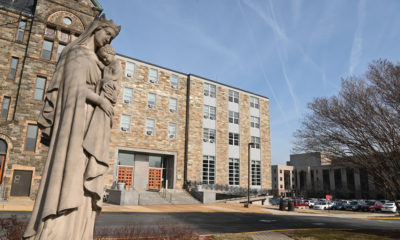Living
College survival guide
Recent LGBT graduates share tips and tools to help you thrive on campus


Always remember the buck stops with you on personal matters. It’s OK to say no to coming out, to sex, to too much involvement or anything else during your college years.
Looking back on my four years as an undergraduate, I’m reminded of all the beautiful friends I met, the wonderful places I was lucky enough to go and the life-changing experiences I was able to have.
College is truly a time for individuals to grow, not only academically and professionally, but on an important personal level as well. As with all matters of life however, there is certainly a flux and flow of the good and the not so good.
Venturing into any unknown situation is intimidating. If you’re LGBT and about to start college, here are some suggestions from a few of us who were just there.
For starters, be sure to find a campus that you’re going to enjoy. A sense of belonging should be high on your college priority list. You do not want to enroll in a campus and then discover that parts of your identity are not welcomed or even celebrated. In this sense, it is perfectly OK to be selfish. Find a campus that you enjoy as much as it enjoys you. As a great resource, check out Campus Pride’s National Listing of LGBTQ-friendly colleges and universities at campusprideindex.org.
When to come out? If you do not feel that it’s the right time for you to come out during college, know that it’s your decision to make. Everyone has his or her own story and own time to tell it. Never feel pressured to come out. Do it at your own pace. Period.
“Honestly, I wish I had been told that I do not have to be out if I do not want to,” says Mariam, a 2015 graduate of the University of Michigan-Dearborn. “There was this huge emphasis on my campus for ‘Coming Out Day’ and it’s not always safe to.“
The only person capable enough to decide how many things you can take on in college is yourself. Do not stretch yourself too thin, too fast. Remember that you have four or more years to engage in everything you want to engage in. Take your time. Remember to balance your academic as well as your self care as priorities.
“Know your limits,” says Matthew, a 2015 Illinois State University graduate. “I always felt on the outside as a queer individual growing up, so when college came around I tried including myself in everything I could get my hands on. Pick a few things you love and rock out on them.”
On a similar note, do not forget that you are allowed to say “no.” Many people fall into a pattern of saying yes to everything that comes their way. This is a quick way to become overworked and even out of tune with yourself. Your college years are the time to experiment and get involved with as much as you can. However, if you’re not willing or able to, there’s a simple, one-word solution — no.
Sex: let’s get real. How honest would an article about college life be if it did not involve anything regarding sex? The answer: not that honest. Sex isn’t a priority for everyone and that’s perfectly fine. However, if you’re having sex then make sure you and your partner(s) are safe and comfortable. In terms of safe sex, many colleges and universities have departments or programs that provide safe-sex resources such as condoms (male and female), dental dams, lubrication, etc. In terms of comfortable sex, make sure that all parties in the encounter give their clear consent. Do not put yourself or someone else in a position that they do not feel ready for. Communication is key. Sex is great, but we have to be able to talk about it first.
Making healthy choices. LGBTQ college students face many challenges that impact their health and well-being on campus. Whether alcohol/substance use or healthy body image issues, there are specific ways these health concerns affect LGBTQ youth differently. Educate yourself and your campus community on the issues related to LGBTQ health and wellness by checking out Campus Pride’s Health and Wellness resources at CampusPride.org/resources
Fabulous, of course. Remember that while you may have amazing circles of support on your campus, parts of the world are still catching up to your fabulousness. When you’re searching for internships or post-graduate positions, do your research. Make sure you find an organization or company that is going to make you feel safe and welcome for all your identities.
“I wish that someone had given me advice on how and where to find employers and geographical locations that are LGBTQ-friendly,” Mariam says. “So looking for an after graduation-job would have been much easier, ya know? I wish that was something career offices made available on the regular: companies that are specifically LGBTQ-friendly.”
Take advantage of the resources your campus has to offer. Many universities have programs designed to help advance the wellness of students. Whether it be through a Career Center, Counseling Services, a Student Involvement Center, an Office of Diversity Advocacy, or even the Campus Recreation Center. Most of the services these departments will provide are of no cost to students. You already paid for much of these resources in your tuition, so take advantage of them.
“I wish someone would have prepped me for what the world feels like when you’re no longer directly protected by the resources and support of a university that provides for LGBTQ students,” says Roze, a University of Missouri-Kansas 2014 graduate.
Making friends outside your circle. Meet up and make friends with people from all walks of life. In doing so, you will be exposed to a rainbow of different ways to view and engage with the world. As this might be a scary thought at first, know that diversifying your experiences will only further your growth as a young adult. As LGBTQ individuals, it’s important to remember intersectionality and that those who may support us also need support in return.
“One thing no one told me is that it’s really easy to get involved in queer/trans issues even if you do not work for a QT organization,” says Kayla, a 2014 graduate of Texas A&M University. “There are all types of community organizations in big cities, college towns, medium-sized cities, etc., and they’re always looking for people. Also, if you’re looking to meet other QT folks, look for a meetup group (meetup.com) or create one if there’s not one in your area.”
Look for role models and mentors. In your search for support and friends, also aim your sights on finding a personal role model or mentor or even multiple. Sometimes it is easier for someone to know what they want in life by observing how others have engaged with the world. Mentors or role models are an incredible source of information and often much more experience in areas you may be interested in yourself.
“It is important to find a mentor,” says Matthew, a 2015 Illinois State University graduate. “I was so, so lucky to have many amazing mentors in college. Queer individuals should always have someone to ask questions of, lean on and be challenged by for growth.”
Selfie care: This is about more than taking time to snap a photo. One of the most important things to remember, not only in college but in all stages of your life, is self care. College can be incredibly busy and stressful at times. Remember that it is OK for you to take a step back and spend time on yourself if you need to. Constructive self-care time will better allow you to take on responsibilities as a student.
“Knowing what I know now about being a queer college student with one degree under my belt, I make a point of telling my students now that they are not alone, that their feelings are valid, and that they are already defying odds by being in college,” Roze says. “So if self care takes precedent over an assignment sometimes, there are always ways to improve your grade, but you have to improve yourself first.”
Why am I here? Never forget the reason you’re in higher education. Have goals and remember that you are there to graduate and receive an education. Sure, it’s easy to doze off and daydream during a long lecture. But what good are you doing yourself if you’re not paying attention to the material? Not only is it a waste of your money, but it is also a waste of your time and growth as a future activist.
“Education is a privilege and access to the language of theory is not something most people have,” says Megan, a 2015 graduate of Metropolitan State College of Denver. “If you cannot back up your theory with actions then what you are left with is a language without meaning. It’s not easy to reframe the way I talk about power and identity outside of academic circles, but I have realized that inaccessible language is a barrier to inclusive social justice.”
With these tools in your back pocket, my hope is that you’re ready to tackle higher education head on. There’s no such thing as too much advice, so don’t stop with this article. Be sure to reach out to those you may know who have experienced higher education for more tips and tools. Always remain proactive, get involved, but to also take time for yourself. Stay fine, fresh and fierce and enjoy every moment you can. These are the glory days.
Tyler Eilts is an alumnus of Illinois State University, where he is also seeking his master’s degree in interpersonal communication and women’s and gender studies. He is a 2015 summer fellow for Campus Pride.
Real Estate
2026: prices, pace, and winter weather
Lingering snow cover, sub-freezing temperatures have impacted area housing market

The D.C. metropolitan area’s housing market remains both pricey and complex. Buyers and sellers are navigating not only high costs and shifting buyer preferences, but also seasonal weather conditions that influence construction, inventory, showings, and marketing time.
Seasonality has long affected the housing market across the U.S. Activity typically peaks in spring and summer and dips in winter; however, January and February 2026 brought unusually cold spells to our area, with extended freezing conditions.
Persistent snow and ice-covered roads and sidewalks have gone for days, and in some cases weeks, before melting. While snow accumulation normally averages only a few inches this time of year, this winter saw below-normal temperatures and lingering snow cover that has significantly disrupted normal activity.
Rather than relying on neighborhood teenagers to shovel snow to make some extra money, the “snowcrete” has required ice picks, Bobcats, and snow removal professionals to clear streets and alleys, free our cars from their parking spaces, and restore availability of mass transit.
These winter conditions have had an adverse impact on the regional housing market in several ways.
- Construction slowdown: New builds and exterior improvements often pause during extended cold, resulting in delayed housing starts when we need affordable housing in the worst way.
- Listing preparation: Cleaning crews, sign installers, photographers, and stagers with trucks full of furniture may be unable to navigate roads and need to postpone service.
- Showings and open houses: Simply put, buyers are less inclined to schedule visits in hazardous conditions. Sellers must ensure walkways and parking areas are clear and de-iced and be able to vacate the property while viewings are taking place.
- Inspection and appraisal delays: Like buyers and sellers, ancillary professionals may be delayed by unfavorable weather, slowing timelines from contract to close.
- Maintenance and repairs: Properties with winter damage (e.g., ice dams or frozen pipes) may experience repair delays due to contractor availability and supply chain schedules. Snow and cold can also affect properties with older and more delicate systems adversely, leading some sellers to delay listing until better conditions arrive.
- Availability of labor: Increasingly, construction, landscaping, and domestic workers are reluctant to come into the District, not because of ice, but because of ICE.
Overall, the District has shown a notable increase in days on the market compared with past years. Homes that once sold in a week or less are now often listed for 30+ days before obtaining an offer, especially in the condominium and mid-range house segments. While part of this shift can be attributed to weather and climate, interest rates, uncertain employment, temporary furloughs, and general economic conditions play key roles.
Nonetheless, we continue to host some of the region’s most expensive residences. Historic estates, including a Georgetown mansion that sold for around $28 million, anchor the luxury segment and reflect ongoing demand for premium urban property.
But even in this high-end housing sector, marketing strategies are evolving based on seasonal realities. Price reductions on unique or niche properties, such as undersized or unconventional homes, reflect a broader market adjustment where competitive pricing can shorten selling time.
For example, a beautifully renovated, 4-story brick home with garage parking and multiple decks that overlook the Georgetown waterfront sold in early February for 90 percent of the list price after 50 days on the market.
At the other end of the spectrum, a 2-bedroom investor-special rowhouse in Anacostia only took eight days to sell for under $200,000, down 14 percent from its original list price. In addition, four D.C. homes took more than 250 days to sell, including an 8-bedroom rooming house that was on the market for 688 days and closed after a 23 percent downward price adjustment.
Some frustrated sellers are simply taking their homes off the market rather than dropping prices below their mortgage balances, although we are beginning to see the resurgence of short sales for those who must sell.
Condominiums and cooperatives offer many opportunities for buyers and investors, with 1,100 of them currently on the market in D.C. alone. List prices run the gamut from $55,000 for a studio along the Southwest Waterfront to nearly $5 million for five bedrooms, four full baths, and 4,400 square feet at the Watergate.
So, while Washington metro area prices remain high, the pace of sales now reflects both seasonal and economic realities. Homes taking longer to sell, in part caused by elements of winter, signal a shifting market where buyers can take more time to decide which home to choose and have a better negotiating posture than in recent years.
Accordingly, sellers must continue to price strategically, primp and polish their homes, and prepare for additional adverse circumstances by reviewing fluctuating market conditions with their REALTOR® of choice.
Valerie M. Blake is a licensed Associate Broker in DC, MD & VA with RLAH @properties. Call or text her at (202) 246-8602, email her at [email protected] or follow her on Facebook at TheRealst8ofAffairs.
Autos
Going for gold: Ford Bronco Sport vs. Toyota RAV4
SUV world has share of bright lights, bold entrances, cut-throat competitors

Let the games begin! Just like the Winter Olympics this month, the SUV world has its share of bright lights, bold entrances, and cut-throat competitors.
Enter the Ford Bronco Sport and Toyota RAV4, both ready to claim the podium but each with a different routine. Think hiking boots versus minimalist trainers. Dirt trails versus perfectly paved roadways.
FORD BRONCO SPORT
$34,000
MPG: 25 city/30 highway
0 to 60 mph: 8.2 seconds
Cargo space: 32.5 cu. ft.
PROS: Boxy chic. Off-road ready. Easy-clean interior.
CONS: Meh gas mileage. Firm ride. Outside noise.
The Bronco Sport doesn’t try to blend in — and that’s the point. With an upright stance, squared lines and retro-rugged styling, this compact SUV looks ready for a backcountry photoshoot before you’ve even left the driveway.
Power comes from a three-cylinder turbo engine that handles daily driving with ease. Opt for the four-cylinder turbo, and the personality shifts from relaxed to assertive. Passing power improves. Highway merges are confident rather than cautious.
The standard 4×4 system sets the tone immediately. Traction is constant. Confidence is built in. Add the G.O.A.T. drive trains (in Ford cute-speak, this means “Goes Over Any Terrain”), and the Bronco Sport adapts to mud, sand, snow and rocks like a decathlete moving between events. Higher trims add skid plates, upgraded suspension and special hardware that makes rough territory feel less intimidating.
On pavement, the Bronco Sport is stable and composed, though the firm suspension can be ass-busting over deep potholes and such. And wind noise at highway speeds is kinda annoying, a tradeoff for the boxy profile.
Inside, durability meets thoughtful design. Rubberized surfaces and easy-clean materials welcome muddy boots, sandy paws or ambitious weekend projects. The cargo area features a flip-up rear window and adjustable floor, making it a breeze to load gear. Storage cubbies and nylon straps keep equipment organized without fuss.
Safety and other tech amenities are modern and practical. Wireless smartphone integration, cameras and driver-assistance gizmos such as adaptive cruise control make daily driving and long trips easier to manage.
What truly sets this SUV apart? In a sea of aerodynamic lemmings, the Bronco Sport feels like a free spirit. Rugged. Confident. A little rebellious.
And, like alpine skier Breezy Johnson, it looks particularly good with a bit of trail dust.
TOYOTA RAV4

$34,000
MPG: 47 city/40 highway
0 to 60 mph: 7.1 seconds
Cargo space: 37.8 cu. ft.
PROS: Fuel savvy. Spacious. Tech-laden features.
CONS: Less-sporty ride. Blasé base trim. Pricey options.
If the Bronco Sport is the adventurous wanderer, the Toyota RAV4 is the precision athlete who arrives early, stretches properly and performs effortlessly. Cue figure skaters Amber Glenn or Paul Poirier and you get the picture.
Fully redesigned for 2026, this compact SUV retains a formula that has made it one of the best-selling vehicles in America, blending efficiency, versatility and lots of tech features.
Toyota nixed the traditional gas engine for the RAV4, but that’s just fine. All models are now either standard hybrids, with fuel economy in the mid-40 mpg range, or plug-in hybrids, which can go up to 50 miles on battery power alone. The result: Vehicles that can handle daily commutes in near silence while retaining long-distance flexibility that would make an Olympic coach proud.
Acceleration is smooth and responsive, particularly in the plug-in hybrid, which is surprisingly quick. The transition between electric and gas power is seamless, though heavy throttle inputs mean the engine sometimes sounds strained. Handling is more predictable than sporty, so this was a minor deduction on the RAV4’s scorecard … at least from me.
But overall comfort is outstanding. The suspension absorbs potholes and uneven pavement with ease, and cabin noise remains impressively low at highway speeds. Long road trips feel relaxed rather than fatiguing — less triathlon grind, more victory lap.
Toyota’s Safety Sense offers adaptive cruise control, lane-keeping assist, enhanced collision avoidance and other systems that operate smoothly without seeming intrusive.
Inside, the revamped cabin is user-friendly. Materials are more refined than before, especially in mid- and upper-level trims. A large, high-resolution touchscreen supports the latest apps, voice commands and over-the-air updates. Such a layout is intuitive instead of flashy — stylish athleisure rather than couture.
Passenger space is generous, and cargo capacity remains among the most practical in this segment. The wide opening is especially helpful when tossing in luggage, sports equipment or an overly optimistic warehouse haul.
For drivers like me who are quick to judge efficiency, reliability and daily usability, the RAV4 delivered a gold-medal performance.

Valentine’s Day is often portrayed as a celebration of romantic love — flowers, chocolates, and candlelit dinners. But for many LGBTQ+ individuals and couples, Valentine’s Day can also be a moment to reflect on something deeper: the love that creates a safe, welcoming home.
For LGBTQ+ home buyers and sellers, homeownership is more than a financial milestone—it is an act of belonging, resilience, and pride. Owning a home can mean finally having a place where you can hold hands with your partner on the front porch, decorate with your authentic style, and build a life free from judgment. In this way, buying or selling a home is one of the most meaningful love stories many LGBTQ+ people will ever write.
This Valentine’s Day, whether you’re a first-time gay home buyer, a same-sex couple upgrading your space, or an LGBTQ+ seller moving on to your next chapter, it’s worth thinking about how love, identity, and real estate intersect—and how to navigate that journey with confidence, protection, and the right support.
Love, Identity, and the Meaning of ‘Home’
For generations, LGBTQ+ people were denied equal access to housing, homeownership, and legal protections. Even today, many LGBTQ+ home buyers still face subtle bias, uncomfortable interactions, or outright discrimination in the real estate process.
That’s why finding LGBTQ+ friendly real estate and an affirming gay friendly realtor or lesbian realtor matters so much. A home isn’t just a building—it’s a personal sanctuary. Working with LGBTQ+ real estate agents who understand your lived experience can make all the difference between a stressful transaction and a joyful one.
For over 30 years, GayRealEstate.com has been the leading gay real estate network, connecting LGBTQ+ home buyers and sellers with gay real estate agents, lesbian real estate agents, and LGBTQ+ friendly realtors who truly “get it.” Their mission has always been simple yet powerful: to ensure that every LGBTQ+ person has access to safe, respectful, and inclusive real estate services.
Finding Your Match: Choosing the Right LGBTQ+ Friendly Realtor
Much like dating, finding the right real estate agent is about compatibility, trust, and communication. Here are some key tips for choosing the best LGBTQ+ real estate representation:
- Look for experience with LGBTQ+ clients. Search for a gay realtor near me or lesbian realtor near me through GayRealEstate.com, where agents are vetted for cultural competency and community commitment.
- Ask about their experience with same-sex couple home buying. A strong agent should understand issues like joint ownership, legal protections, and financing considerations.
- Choose someone who listens. You should feel safe sharing your priorities—whether that includes proximity to LGBTQ+ nightlife, affirming schools, or lesbian-friendly neighborhoods.
- Prioritize respect and transparency. Your agent should advocate for you, not just push a quick sale.
The right gay friendly real estate agent isn’t just helping you buy a house—they’re helping you find a place to build your life.
Best Cities for LGBTQ+ Home Buyers
If love is your compass, location is your map. Some of the best cities for LGBTQ+ home buyers consistently offer strong community presence, legal protections, and welcoming neighborhoods:
- Wilton Manors, Florida – A hub for LGBTQ+ culture with thriving LGBTQ+ real estate opportunities
- Palm Springs, California – A long-standing LGBTQ+ retirement and second-home destination
- Provincetown, Massachusetts – Historic LGBTQ+ community with progressive housing protections
- Asheville, North Carolina – Growing market with inclusive real estate services
- Fort Lauderdale, Florida – Diverse, welcoming, and highly sought-after for LGBTQ+ home ownership
Working with GayRealEstate.com allows you to connect with local LGBTQ+ real estate experts who know these markets inside and out.
Navigating Legal Protections in LGBTQ+ Real Estate
Love is universal—but legal protections are not always consistent. Understanding your rights is essential when buying or selling a home as an LGBTQ+ person.
Key protections include:
- Fair Housing Act (FHA): Prohibits discrimination based on sex, which courts have increasingly interpreted to include sexual orientation and gender identity.
- State and local protections: Many cities and states offer additional safeguards against LGBTQ+ housing discrimination.
- Same-sex couple legal considerations: If you are married, joint ownership is typically straightforward. If not, consult an attorney about co-ownership agreements.
A knowledgeable LGBTQ+ friendly realtor from GayRealEstate.com can help guide you through these complexities and connect you with trusted legal professionals when needed.
Buying a Home as an LGBTQ+ Person: Practical Tips
If you’re embarking on your home-buying journey this Valentine’s season, here are smart, practical steps to take:
- Clarify your priorities. Do you want a vibrant LGBTQ+ neighborhood, quiet suburbs, or access to queer community spaces?
- Get pre-approved for a mortgage. This strengthens your position in competitive markets.
- Work with an LGBTQ+ real estate agent. Searching “finding a gay real estate agent” or “finding a lesbian real estate agent” through GayRealEstate.com is a great first step.
- Research inclusive communities. Some neighborhoods are more welcoming than others.
- Know your rights. If you experience bias, document it and seek legal guidance.
Buying a home is an act of self-love—and community love.
Selling a Home as an LGBTQ+ Person
Selling can be just as emotional as buying, especially if your home represents years of memories with your partner, friends, or chosen family.
When selling a home as an LGBTQ+ person, consider:
- Working with a gay friendly realtor who will market your home inclusively
- Highlighting LGBTQ+ community appeal in listings
- Being prepared for potential buyer bias (and knowing how to respond)
- Leaning on GayRealEstate.com’s LGBTQ+ real estate services for trusted guidance
Your story—and your home—deserve respect.
Real Estate for LGBTQ+ Families
More LGBTQ+ couples are raising children, fostering, or building blended families. This makes homeownership even more meaningful.
When searching for real estate for LGBTQ+ families, consider:
- LGBTQ+ affirming school districts
- Family-friendly queer communities
- Safe neighborhoods with inclusive values
- Access to LGBTQ+ resources and social networks
GayRealEstate.com specializes in helping LGBTQ+ families find homes that truly fit their lives.
Love, Pride, and Homeownership
At its core, Valentine’s Day is about connection. For LGBTQ+ people, homeownership can be one of the most profound expressions of love—love for yourself, your partner, your family, and your future.
Whether you are a first-time gay home buyer, a same-sex couple relocating, or an LGBTQ+ seller moving forward, you deserve an experience rooted in dignity, fairness, and celebration.
For over three decades, GayRealEstate.com has stood as the leading source for LGBTQ+ real estate, gay real estate, lesbian real estate, and LGBTQ+ home buying and selling representation. Their nationwide network of gay real estate agents, lesbian-friendly real estate agents, and LGBTQ+ friendly realtors ensures that your real estate journey is guided by professionals who understand your heart—and your home.
This Valentine’s Day, let your next chapter be written in a place where you can truly belong. Because when love leads the way, home is never far behind.
Scott Helms is president and owner of Gayrealestate.com.
-

 Movies5 days ago
Movies5 days agoRadical reframing highlights the ‘Wuthering’ highs and lows of a classic
-

 District of Columbia4 days ago
District of Columbia4 days agoJudge rescinds order against activist in Capital Pride lawsuit
-

 Ecuador5 days ago
Ecuador5 days agoJusticia reconoce delito de odio en caso de bullying en Instituto Nacional Mejía de Ecuador
-

 District of Columbia4 days ago
District of Columbia4 days agoTrans activists arrested outside HHS headquarters in D.C.




















